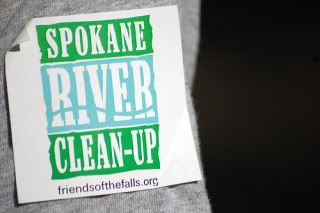Another Green Monday

The seventh Spokane River Clean-up was another smashing success thanks to the volunteers who stepped up. And once again, DTE left the secure digital veil of the blogohood to lead team Black Bear into the wilds along Hangman Creek.
(Photo by communicator.)
We had exchange students from the Mukogowa Institute, rookies, friends, a nemesis who ditched, and much more. Relatively smooth and P.G. rated, cleaning this area can be an epic full-disclosure experience for our river stewards. There were homeless camps and many, many empty high-volume beer cans but no needles or porn like years past on this route. Phew. Roughly estimated at 750 volunteers spread around High Bridge, the University District, and T.J. Meenach, it’s still too early to report on how much we collected. Check here for an S-R slideshow and here for an initial report. Last year there were over eight tons of trash, two tons of that amount recycled. Major props to Steve Faust for all of his hard work in organizing. Faust is to be congratulated when Mark Angelo, the founder of World Rivers Day said “the Spokane River event is the biggest clean-up or work-oriented event taking place that we know of.” Faust is hopeful that the event will be even bigger and better in the future. “A goal for next year might be to expand out to Liberty Lake, but we’ll just have to see,” Faust told the S-R. Before, he has mentioned the true measure of the Spokane River Clean-up success is how well we affirm and reinforce the value of stewardship for our river, spread that message to the broader community, and have fun doing it. By that measure we can claim victory for another wonderful Spokane River Clean-Up. See you all next year.
Here are some stories you might’ve missed.
From sportsmen to green thumbs, climate change being felt in Idaho. A recent Idaho Stateman story took a look at the faces of a changing climate with a story about how rising temperatures, (Boise's average temperature has risen nearly one degree in the last century) are affecting citizens, businesses, and of course the land. "You don't have to believe - as most of the world's scientists do - that the change is caused by increased levels of greenhouse gases in the atmosphere brought on by human activities - to realize something is happening." Read more HERE.
Severn Suzuki - all grown up. Surely you've seen, or maybe even remember in 1992 when Severn Suzuki, daughter of David Suzuki, then a 12-year old, addressed delegates gathered in Rio de Janeiro for the Earth Summit in a moment that's now referred to as ""The Girl Who Silenced the World for 6 Minutes". Well that was 17 years ago, and today Severn Culliss Suzuki is still talking about youth and climate change. She recently gave an interview about the value and limits of having youth weigh in on climate change deliberations to Andrew Revkin of Dot Earth. "Sometimes I worry that by incorporating them into the system, the youth voice might be lost in the complexities of the U.N. And they are treated as just another stakeholder — given only a few minutes to speak at the end of a conference — yet youth make up half of the world’s population! They are the ones with everything at stake." Read more HERE.
Canadians declare victory over pine beetles. If you've driven through Western Montana anytime this decade, you'd think pine trees over there were naturally red and orange - unfortunately, it's because Pine beetles have claimed millions of acres of trees. An epidemic that isn't leaving a lot of folks with hope. In Canada, Pat Bell, the British Columbia forest minister, recently announced that their mountain pine beetle epidemic is over. But it has nothing to do with the beetles being defeated, instead, they have run out of trees - a victory that Bell isn't too excited about. “The bad news is that it’s because they don’t have any food left to eat," Bell said. "The vast majority of our pine stands have been killed at this point, and we are really in a salvage mode," - meaning mills are running out of wood and old-growth forests and protected areas are being sought. Read more HERE.
